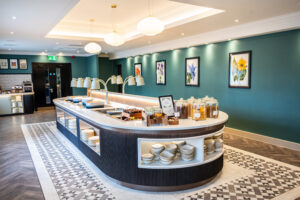
Keep calm and carry on
Our environment contributes enormously to our physical and mental wellbeing, and this can be equally applied to our work and public spaces. Wherever large numbers of people meet, the potential for stress and distress is magnified. In this blog, Jo Austin, Sales Director of The Venues Collection and Lime Venue Portfolio looks at ways in which conferences and large gatherings can be designed to enhance attendee comfort.
Whether you are an organiser, a participant or an attendee, meeting venues can be a sensory minefield. The piped music, harsh lighting and cacophony of hundreds of simultaneous conversations can all take their toll – and that’s before you factor-in the strain of presenting yourself and your organisation to the people you need to impress.
But increasingly, venues are focusing on creating happy, healthy and thoughtful event spaces that promote delegate wellbeing and give all stakeholders the best chance of positive engagement.
Open air
Many venues have developed attractive outdoor areas where people can relax between sessions, take in some fresh air and rest their eyes on trees and flowers. Even city centre locations are working to offer terraces or roof gardens that will bring a calming dimension to events. They are encouraging organisers to incorporate outdoor spaces into their programmes by hosting the social elements outside, such as drinks on the terrace, mid-morning coffees in the gardens or a lunchtime barbecue on the roof.
One event professional, Helen Moon, Chief Executive of EventWell, has taken wellbeing to a new level by introducing Quiet Rooms at conferences, receptions, parties and exhibitions. EventWell is the event industry’s charitable social enterprise supporting mental health and wellbeing. Helen says that while everyone can benefit from a safe, quiet space in a busy, noisy environment, one particular group will appreciate the chance to escape the sensory storm.
Downtime
As many as 20 per cent of the UK adult population have been diagnosed with neurological conditions including obsessive compulsive disorder (OCD), autism spectrum disorders, dyslexia and attention deficit hyperactive disorder (ADHD). This doesn’t prevent them from being highly competent and valued team members, says Helen: each person has a brain that is unique to them and brain differences are natural variations. But it does mean that they are likely to feel over-stimulated and overwhelmed in crowded noisy places. In extreme cases visitors have panic attacks or feel the need to leave the building. Some people will avoid attending business events altogether, knowing the experience will prove to be too much for them.
With this in mind, EventWell launched its first Quiet Room in 2021 – at a military arms fair. Helen reports that even tough members of the armed forces embraced the concept of a calm non-threatening space that provided a few minutes’ downtime during a hectic day. Since that time, she has gone on to replicate the concept at events throughout the UK and Europe.
Safe spaces
So what exactly do Quiet Rooms look like? They are safe spaces designed specifically to help people recover from sensory overload and are being used in places as diverse as football stadiums and music festivals. A Quiet Room can accommodate several people at any one time, but, as the name suggests, it’s not a place for socialising or phone conversations. Its purpose is to enable relaxation and with that in mind it features low lighting, and minimal stimulus. Visitors leave their phones at the door and use noise-eliminating headphones to aid relaxation. The air is scented with relaxing essential oils.
Quiet Rooms need to be located in flexible spaces to ensure that they are in the right place for both the event and the attendees. Interestingly, inclusion best practice dictates they should not be far away from the main buzz of the event.
Professional support
Helen stresses that when putting in Quiet Rooms for attendees, event organisers should always work with organisations like EventWell to ensure the space is expertly supervised with trained hosts who can offer professional mental health support, otherwise, says Helen, vulnerable people could be put at risk.
There’s a lot that we can all take away from the example of EventWell’s Quiet Rooms and if delegates are informed about the existence of a Quiet Room in advance of the event, it may well ease the concerns that some of us still feel about returning to face-to-face meetings.
If you’d like to discuss ways of adding elements of calm and relaxation to your event, our sales team will be delighted to explore opportunities enquiries@thevenuescollection.co.uk
Go back to other articles

